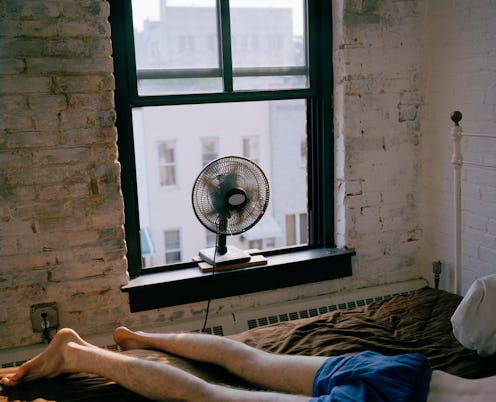Health
Why Experts Say Sleeping With A Fan On Isn’t Totally Risk-Free
We’ve all seen the videos on TikTok, but here’s what the professionals advise.

Getting a good night's sleep is no picnic in the middle of a heatwave. Is it just me or does the hot, clammy weather turn the whole thing into an Olympic sport rather than a cosy reprieve? Not cool (pun intended). A lot of people tend to stick on a fan to give their bodies some semblance of cool air when the weather gets like this — but what about at night? Is it safe to sleep with an electric fan on?
The answer is yes, but with a few conditions. Sleeping with a fan on can be dangerous if you don't check that your fan is working properly, that it has been safety tested by the manufacturer, and that you have it set up in the correct environment.
What Risks Are Associated With Sleeping With An Electric Fan On?
The biggest risk of sleeping with an electric fan on is that it could be a potential fire hazard. There’s a small possibility with any electrical appliance that it can get too hot and catch fire, which is especially dangerous when you’re asleep as not only will you have a delayed reaction time, but you’re more susceptible to smoke inhalation whilst already unconscious.
How Can You Minimise The Risks Of Sleeping With An Electric Fan On?
When using an electric fan, you should regularly check that it’s safe to use. Start by looking for its CE mark on the product or its packaging, which confirms that it’s “been safety tested against rigorous international standards and is safe to use in the home,” says Steve McEvoy, a chartered engineer at Prism Nova (and, full disclosure, also my father).
However, as McEvoy points out that “unfortunately there are a lot of fake goods on the market,” which means “CE marks can be just as fake as the goods themselves.” In other words, make sure you do your research to check the legitimacy of the product.
And, even if your fan is legit, you should “always be cautious when using anything electrical” McEvoy adds, as products “can contain manufacturing defects that can result in safety issues.”
To make sure that your fan — and other electrical appliances — around your home are safe, McEvoy suggests “regularly check the that the plug and cable are in good condition, in particular make sure the cable isn't frayed, split or excessively twisted.” And when it comes to fans, immediately stop using them if it begins to “make unusual noises or if you can smell or see the effects of heat, smoke, scorching or burning anywhere on it.”
Can Sleeping With An Electric Fan On Affect Your Health, Too?
Yes, sleeping with a fan on can have some adverse effects on your health, too. Most notably, it can dry out your skin, eyes, mouth, and nose; may lead to irritation for those with allergies; and can even cause muscle cramps.
People who sleep with a constant stream of air directly on them may wake up with stiff or sore muscles, says Sleep Advisor. This is because concentrated cool air can make muscles tense up and cramp.
How Sleeping With A Fan On Can Affect Your Skin, Eyes, Mouth, & Nose
Most experts are in agreement that fans have the potential to cause issues for your skin by drying it out. The same goes for your eyes, mouth, and nose. As Dr. Seema Sarin M.D., the director of lifestyle medicine at EHE Health, told Bustle last year, “A fan can cause your nasal passages and mouth to lose precious moisture through evaporation, drying them out.” And, if you are one of the people who sleeps with their eyes partially open, they will be susceptible to drying out, too.
As Dr Sarin explained, “A fan circulating air around the room can promote drier air, which can lead to drying out of your mucous membranes and sinus irritation.”
How Sleeping With A Fan On Can Affect Your Allergies
Dr. Sarin also revealed that sleeping with a fan on may cause “more harm than good” if you suffer from allergies.
“First, a fan is going to blow air around the room and with that, it blows around dust particles,” she said. “If you are allergic to dust mites, it can exacerbate your symptoms with increased exposure.” Fans can also circulate pollen, she said, which may exacerbate hayfever symptoms.
To guard against possible allergens, Dr. Len Horovitiz, a pulmonologist at Lennox Hill Hospital in New York City, recommends using an air filter in the bedroom.
How To Keep Cool At Night Without An Electric Fan
If you don’t want to sleep with an electric fan on, what other options are available?
One is keeping your bedroom cool as you can all day, another is filling a hot water bottle with ice water or lining your bed with a large cooling mat. The National Sleep Foundation also have some tips to keep cool during the night in their Heatwave Plan, which you can read here. And there are plenty of Brits on TikTok that have shared their inventive ways of staying cool at night without a fan.
The most important thing to remember during a heatwave – whether you’re sleeping with a fan on or not – is to stay hydrated. Make sure you drink plenty of water and stay alert when it comes to heat exhaustion and heatstroke.
This article was originally published on